calsfoundation@cals.org
Cowboy Churches
Cowboy churches are a version of Christian worship typified by a relaxed “come-as-you-are” ethos and generally following western themes and décor. The movement came to Arkansas with the new millennium and has enjoyed a growing audience.
A typical cowboy church service is short on ceremony, relying instead on literal, plainspoken Bible teaching, often accompanied by preaching and gospel music played by a country and western band. Baptisms are sometimes included, often performed by plunging a person into a stock tank. Congregations are supported by a battery of ministries and host trail rides, cookouts, barrel races, and roping contests. Congregants—many of whom feel alienated by other types of worship services—come from all segments of society.
The ministry has its roots in Texas, where, in the 1940s, a radio program called “Cowboy Church in the Air” gave name to a movement that would not begin until thirty years later. By 1970, professional rodeo riders started following the teachings of superstar evangelists (despite living in a sport culture known for partying hard and skipping church on Sunday). The trend grew, and services were soon a familiar part of rodeo events. In 1985, regular services began in the rodeo arena of the famed nightclub called Billy Bob’s Texas. The self-proclaimed “World’s Largest Honky Tonk” became the first stationary cowboy church.
By 2000, mainstream Protestant denominations, especially Baptist groups, seized upon the concept as a means to reach people who otherwise did not feel comfortable attending worship services. The Cowboy Church of Ellis County in Waxahachie, founded by the Baptist General Convention of Texas, quickly grew to become one of the largest congregations in the country. Being fostered by an established denomination gave the cowboy church new legitimacy.
As in other states, cowboy churches in Arkansas began with small meetings in rodeo arenas, feed stores, or barns, thus making a historical accounting difficult. By 2002, a musical act with an underlying church message called Cowboy Church of Hot Springs was established. Playing on Sundays in various Hot Springs (Garland County) theaters, the group’s concerts included a sermon and altar call.
By June 2, 2004, the movement in Arkansas had at least one other permanent church, Higher Trails Cowboy Church in Paragould (Greene County). Other early Arkansas churches include Cross Point Cowboy Church in Nashville (Howard County), established in 2006; Cross Bar C Cowboy Church in Benton (Saline County), founded in 2007; and Branded By Christ Cowboy Church in Danville (Yell County), created in 2008. By 2010, the number of cowboy churches in the state had grown to fifteen; by 2015, there were about twenty-five.
Other cowboy churches in Arkansas as of 2015 include: 3C Cowboy Church (formerly Christ’s Cowboy Corral) in Foreman (Little River County), Bar None Cowboy Church in Midway (Baxter County), Calvary Trail Cowboy Church in Louann (Ouachita County), Circle Cross Cowboy Church in Glenwood (Pike and Montgomery counties), Circle J Cowboy Church in Texarkana (Miller County), Conway Cowboy Church in Conway (Faulkner County), Crooked Creek Cowboy Church in Harrison (Boone County), Crossroads Cowboy Church in El Paso (White County), Destiny Cowboy Church in Austin (Lonoke County), FWF Cowboy Church in Beebe (White County), Foothills Cowboy Church in Batesville (Independence County), Free Range Cowboy Church in Greenwood (Sebastian County), Grace Cowboy Church in Warren (Bradley County), Green Forest Cowboy Church in Green Forest (Carroll County), J-C Cowboy Church in Lewisville (Lafayette County), Madison County Cowboy Church in Huntsville (Madison County), Mountain Top Cowboy Church in Heber Springs (Cleburne County), Open Range Cowboy Church in Ozark (Franklin County) Perryville Cowboy Church in Perryville (Perry County), Rafter-J Cowboy Church in Hope (Hempstead County), and Riding on Faith Cowboy Church/Faith Country Church in Salem (Fulton County).
Cowboy churches—Arkansas’s included—claim Baptist affiliation more than any other denomination, although the Church of the Nazarene, Methodists, and Assemblies of God have also carved out a share of cowboy ministries. Affiliation means different things depending on the church; some churches are full-fledged members with accountability to church hierarchy, while others are linked simply by doctrine. True to the movement’s roots, many cowboy churches remain fiercely non-denominational and independent.
By 2015, the American Fellowship of Cowboy Churches estimated the number of churches nationwide to be more than 200, but the informal, even transient, nature of such congregations makes an accurate headcount nearly impossible. Even so, the growth of cowboy churches—quickly moving past just cowhands and rodeo riders—is undeniable. In fact, Baylor University’s Truett Seminary and Dallas Baptist University now offer courses in cowboy church leadership.
For additional information:
American Fellowship of Cowboy Churches. http://americanfcc.org/ (accessed November 17, 2020).
Berry, Cody. “A Look at Benton’s Cross bar C Cowboy Church.” Daily Record, January 21,–27, 2019. Online at https://www.dailyrecord.us/a-look-at-benton-s-cross-bar-c-cowboy-church (accessed November 17, 2020).
Bryan, Wayne. “Cowboy Church Growing in New Home.” Arkansas Online, Three Rivers Edition, April 24, 2014. http://www.arkansasonline.com/news/2014/apr/24/cowboy-church-growing-new-home/ (accessed November 17, 2020).
Burnett, John. “Cowboy Church: With Rodeo Arena, They ‘Do Church Different.’” National Public Radio, September 1, 2013. http://www.npr.org/2013/09/01/217268202/cowboy-church-with-rodeo-arena-they-do-church-different (accessed November 17, 2020).
Chammah, Maurice. “Where Have All the Cowboy Churches Come From?” Texas Monthly, July 24, 2014. http://www.texasmonthly.com/story/where-have-all-cowboy-churches-come (accessed November 17, 2020).
Gauntt, Paul. “History of Cowboy Church Movement.” Waxahachie Daily Light, April 25, 2009.
Hebda, Dwain. “Once Was Lost, Now Am Found.” Arkansas Democrat-Gazette, Three Rivers Edition, January 19, 2020, pp. 1S, 6S.
———. “Walking the Walk.” Arkansas Democrat-Gazette, November 22, 2014, pp. 4B–5B.
Keith, Tammy. “Cowboy Church Hopes to Rope in New Members with Relaxed Atmosphere.” Arkansas Online, November 11, 2012. http://www.arkansasonline.com/news/2012/nov/11/cowboy-church-hopes-rope-new-members-relaxed-atmos/?f=rivervalley (accessed November 17, 2020).
Lauer, Claudia. “Church’s Rebound Full of Twists.” Arkansas Online, May 1, 2011. http://www.arkansasonline.com/news/2011/may/01/churchs-rebound-full-twists-20110501/ (accessed November 17, 2020).
Rolf, Carol. “Danville’s Cowboy Church Provides ‘Come-as-You-Are’ atmosphere.” Arkansas Online, August 2, 2009. http://www.arkansasonline.com/news/2009/aug/02/danvilles-cowboy-church-provides-come–yo-20090802/ (accessed November 17, 2020).
Dwain Hebda
Little Rock, Arkansas
 Divergent Prosperity and the Arc of Reform, 1968–2022
Divergent Prosperity and the Arc of Reform, 1968–2022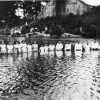 Religion
Religion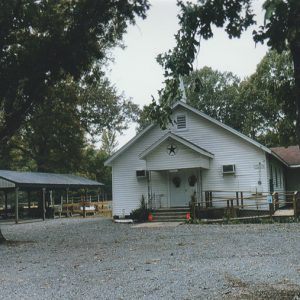 Austin Church
Austin Church 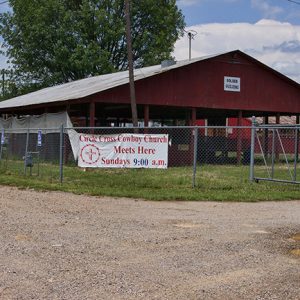 Circle Cross Cowboy Church
Circle Cross Cowboy Church 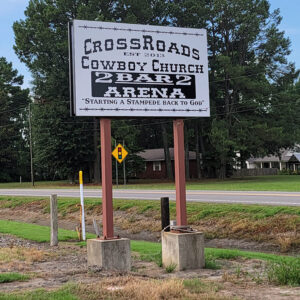 Crossroads Church Sign
Crossroads Church Sign 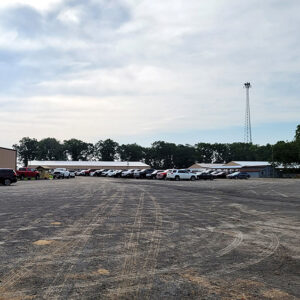 Crossroads Cowboy Church
Crossroads Cowboy Church 




Comments
No comments on this entry yet.